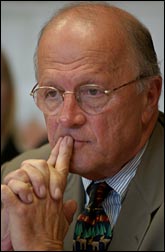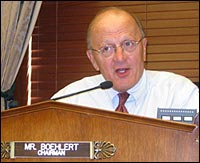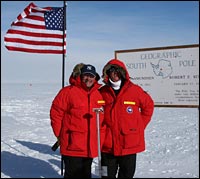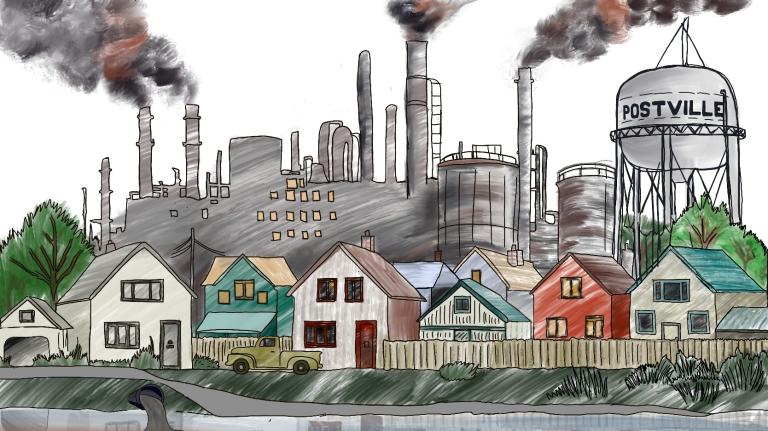
Sherwood Boehlert.
Photo: AP/Jim McKnight.
When leading U.S. climate scientist James Hansen accused NASA earlier this year of stifling his public speech on climate change, Rep. Sherwood Boehlert (R-N.Y.) sprang into action. Chair of the House Science Committee, Boehlert immediately fired off a stern letter to the NASA administrator, asserting that “when it comes to an issue like climate change, a subject of ongoing public debate with immense ramifications, the government ought to be bending over backward to make sure that its scientists are able to discuss their work and what it means.”
It was only to be expected from one of the most ardent environmental defenders in Congress. Boehlert has been speaking his mind in the House since 1983, but his era is coming to an end. In March, he announced that he won’t seek reelection — to the disappointment of many moderate Republicans and environmentalists.
Boehlert has played a key role in shaping environmental policy since the first Bush administration, when he spearheaded Washington’s war on acid rain by helping to design a pioneering pollution-trading program for sulfur dioxide. Since then, he has been a supporter of endangered-species protections, mandatory greenhouse-gas restrictions, efforts to safeguard the Arctic National Wildlife Refuge, and stronger fuel-economy standards. Days after Hurricane Katrina, Boehlert introduced a bill that proposed significantly boosting CAFE (corporate average fuel economy) standards over the next decade.
Despite running up against vehement opposition to some of his green initiatives from members of his own party, the New York Republican is as loyal to the GOP as ever. He recently spoke with Grist about his environmental conversion moment, his chats with Dubya on matters green, and why he thinks the Dems won’t win the majority in Congress this year.
In your retirement speech, I was struck by your words, “It’s time.” Why is now the time for you to retire?
I will be 70 in September, and I vowed long ago that I don’t want to leave my job, which I love so much, on a stretcher or in a box. I’ve completed 42 years in Congress as a staffer and a member. I’m going out on top, under my terms.
Also, I’m a bigamist. I’m married to the love of my life, my wife Marianne, who’s my partner and my best friend and my biggest booster and my most constructive critic. But I’m also married to my job. It’s time to focus on one marriage only, and my four children and six grandchildren.
What about the political timing of your retirement? Some bemoan your departure because as a moderate, pro-environment Republican, you have played a crucial role in keeping your more extreme colleagues in check.
In my entire congressional career, I have never seen the kind of intense partisanship that I see now. There is almost no tolerance for another point of view. The vitriol is staggering. But that, in turn, is empowering the minority within the majority, the moderate Republicans, and there is a growing cohesiveness of vision and strategy among us.
So you are optimistic about the fate of moderates in the Republican Party?
I’m encouraged that the moderate Republicans have what I think is the best approach to governing. And I’m encouraged that more and more people are beginning to appreciate that.
What do you think is going to happen in the 2006 elections? Are the Republicans in danger of losing the majority?
In any election, any side is in danger of losing any seat. There’s no such thing as a sure bet. I feel confident that the Republicans will maintain the majority because we don’t have any serious opposition in the marketplace of ideas. The Democrats’ approach is to fault the Republicans, say, “We would do better than them,” but they haven’t come up with a plan! No one can identify with the Democrat plan for America; everybody knows what the Republicans are proposing to do.
What do you see as your biggest legislative victories related to the environment?

Boehlert chairing the House Science Committee.
In recent years, the main victories have been in warding off those who want to undo what has been done so well over many decades. Whether you’re on the field of sport or in a political contest, defense is often a major part of the game. And so we have been able to prevent a lot of harmful undoing of existing environmental laws, namely, the Endangered Species Act and attacks on ANWR.
But I suppose the biggest victory looking back was acid-rain regulation. That was my addition to the Clean Air Act amendments signed into law by President George Herbert Walker Bush, which launched the nation’s war on acid rain. That’s my legacy. That proved the success of a cap-and-trade system in which polluters buy and sell the right to pollute, and it is now the basis of international climate strategy.
Are there any victories that you wish you could have achieved but didn’t?
Improvements to CAFE standards. But hope springs eternal. We’re moving in the right direction. When I first offered the CAFE amendment in the 107th Congress, we got 160 votes. Didn’t succeed. Next, in the 108th Congress, we got 162 votes. That comes to the 109th Congress, the same process, we got 177 votes. And that progress was made before Katrina, before $3-a-gallon gas. I’m convinced the next time it comes up on the floor — hopefully later this year — it will pass.
The fact of the matter is the technology is already on the shelf gathering dust. We don’t have to launch some massive new research program to discover how we can make vehicles more fuel efficient, we already know how. It’s gonna cost a few bucks, but at $3 a gallon for gasoline, the payback period is short order.
What do you think of the administration’s CAFE revisions, which include light trucks?
Totally inadequate.
As chair of the House Science Committee, do you think the Bush administration has fairly incorporated objective scientific research into the development of its policies, particularly environmental and energy policies?
I won’t give you a direct yes or no, I’ll finesse it this way: I think the administration should pay a lot more attention to the scientific consensus as it considers the policy options. And if they did, I think some of their policies would be different. For example, they would have proposed much higher CAFE standards.
What’s your take on the James Hansen flap? Has there been unfair censorship of objective scientific opinion under the Bush administration, as he contended?
Well, let me tell you, as someone who was immediate — immediate — in my criticism of NASA for the way that was handled, and who immediately took action, my investigation revealed no fingerprints from on high. That wasn’t directed from the office of the [NASA] administrator or the White House. It was a rogue public-affairs operative.
So you don’t feel there has been unfair censorship of objective scientific opinion?
Well, there’s anecdotal evidence, but when you try to track it, the paper trail never traces back to the White House. Nevertheless, I think the administration should pay a lot more attention to the scientific consensus, particularly on climate change.
Didn’t you recently take a trip to the Antarctic? Can you tell us a little bit about that?

Boehlert (left) and Rep. Bob Inglis (R-S.C.) way down south.
I took a 10-member congressional delegation led by the Science Committee to review a billion-dollar climate research project that we are funding. Two others besides me were “climate believers” when we went there, the seven others were undecided on the matter. All of us were believers when we came back. The evidence of warming patterns was breathtaking.
How do you feel about President Bush’s refusal to develop policy solutions to climate change?
I’ll tell you the same thing I told the president. And I did tell him this once again recently — I had a conversation with him aboard Air Force One. We’re flying from upstate New York to Washington. We’re having a peanut butter sandwich and a glass of milk. Literally, that was our fancy lunch. And we’re talking. And I said, “You know, Mr. President, I tell the people that I deal with that whenever I talk to you about very sensitive yet controversial subjects like global climate change or CAFE standards, I always feel good after that conversation.” And then I paused. And then I said, “It’s your staff that screws it up.” And he laughed. He turned to Karl Rove and said, “You hear that?”
I really do believe that, I do feel, in his heart of hearts, the president is much better at appreciating the importance of the environment than he is made to appear. But he’s made to appear that way because of actions by the administration. That doesn’t make it right, but it’s my opinion nevertheless.
We still see some leaders, such as Sen. James Inhofe and Rep. Richard Pombo, dispute the science on climate change. How do you talk with them about this?
Well, you don’t really. I know both of these guys well. I used to sit side by side with Inhofe when he was in the House and on the transportation committee. I talk with them about a lot of things, but it’s almost like hitting your head against a wall to try to talk with either one of them about something like this, because they have made up their mind. They don’t want to be confused by the facts, and they are very determined to present the opposite point of view.
Can you give an example of an interaction?
A significant occurrence happened in the past several months. A group of evangelicals came out and issued a statement saying that this is for real, something we have to deal with. It’s part of our responsibility to be good stewards of the earth. And immediately Inhofe issued a statement saying one or two of them had been co-opted by the extreme environmentalists. Wrong! It was not one or two of them, there were 80-some-odd — a list that included some of the most respected names in the evangelical movement. Still, that was their knee-jerk reaction: Well, they must have been co-opted by some extremist. And that wasn’t the case at all.
Do you feel as loyal to your party as ever today? Do you feel betrayed by these extreme tactics?
My party’s not betraying me. My party’s not employing tactics that are extreme. Individuals that are identified with my party are guilty of that conduct. But so too are individuals in the other party. People like to say, “Well, the Democrats own the environment as an issue and the Republicans are, to a person, enemies of the environment.” And I say that’s absolutely wrong, and I remind people that the Environmental Protection Agency was the creation of Richard Nixon by executive order. Theodore Roosevelt, John Chafee, Nelson Rockefeller make up just a few of the many environmental champions of my party. Those are our roots and we will fight to maintain them.
Did you have some kind of environmental conversion experience? What turned you onto these issues?
When I was young and just getting involved in this business called politics, my governor was Nelson Rockefeller. And I’ll never forget a poster that Rockefeller used for his first reelection campaign, and it was a nouveau art sort of photo of fish swimming in the deep waters, very colorful, and it said, “If fish could vote, they’d vote Rockefeller.” That stuck with me my whole career.
I was born and raised in the foothills of the Adirondacks, where the devastation of acid rain was so evident. I love to fish there, and a lot of my constituents are fisherpeople. And they would say to me, “You realize some of those lakes you’re looking at, fish can’t live in them?” I said, “Wait, that’s crazy, fish can live in the lakes.” “No, they can’t.” “Why?” “It’s too acidic. Acid rain has destroyed it.” They made me realize that all that beauty was in jeopardy if we kept doing business as usual, so I fought for change.

